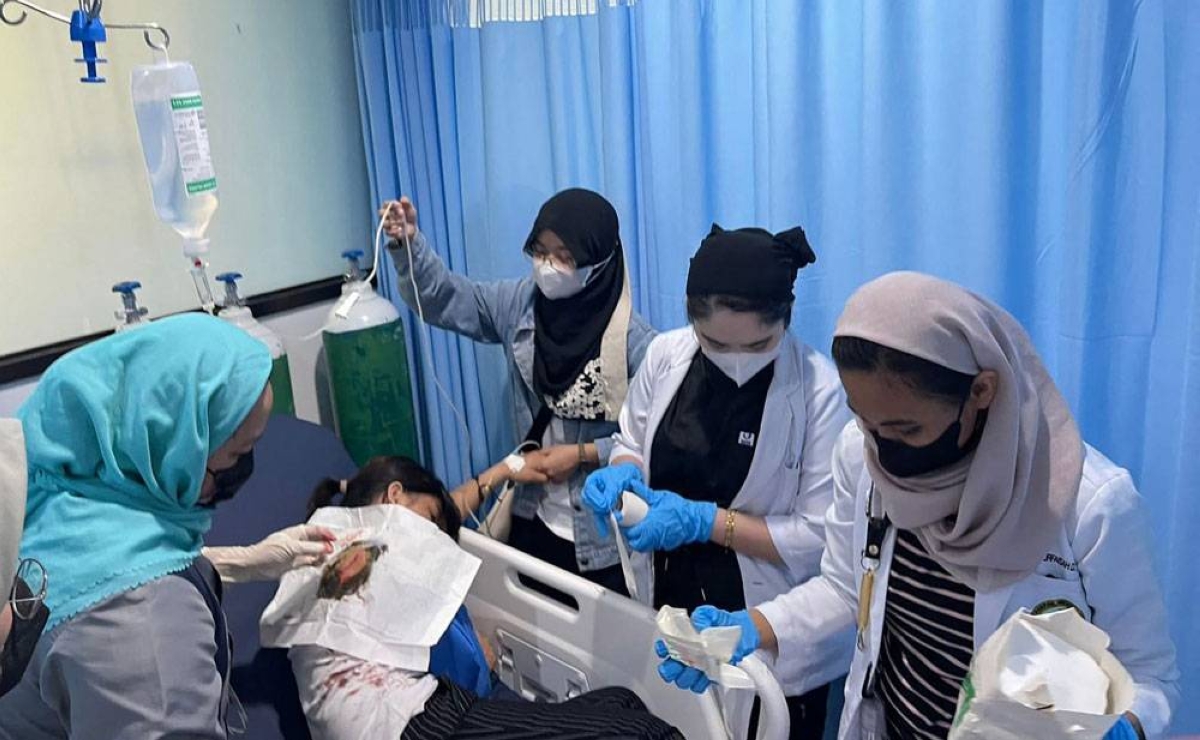Tragedy Strikes Mindanao State University: Exploring the Aftermath of the Gymnasium Explosion
On a fateful Sunday morning, tragedy struck Mindanao State University (MSU) in Marawi City, leaving at least 11 people dead and several others injured. The explosion occurred during Mass, sending shockwaves through the campus and the surrounding community.
According to reports from the Philippine Army 1st Infantry Division (1ID), approximately 46 individuals were rushed to the Amai Pakpak Medical Center in Marawi following the blast. Major General Gabriel Viray III, the commander of 1ID, confirmed that three women and one man were among the casualties.
Authorities are currently investigating the incident to determine if it is connected to the recent killing of 11 members of the Dawlah Islamiyah (DI) militant group. Bangsamoro Police Regional Office chief, Brigadier General Allan Nobleza, stated in a radio interview that they are exploring all possible links between the two events.
The MSU administration has condemned the incident and expressed their heartfelt condolences to the victims and their families. As a precautionary measure, the university has decided to suspend classes until further notice.
Survivors of the explosion shared their harrowing experiences. Chris Jurado, a 21-year-old university student, recalled the suddenness of the blast during the morning Mass. “It was really sudden, and everyone ran,” Jurado said. “When I looked behind me, people were lying on the floor. We didn’t know what happened because everything happened so fast.”
Another survivor, 19-year-old Rowena Mae Fernandez, initially had no idea what was happening until she saw others running. “My companion and I also ran, even though we fell on the ground at one point. That was the only thing I remembered until I got out of the gym, and I fell again,” she shared from her hospital bed. “My friends were crying because they saw my injury.”
Marawi City Mayor Majul Gandamra called for unity among the Muslim and Christian communities in the wake of the tragedy. “Our city has long been a beacon of peaceful coexistence and harmony, and we will not allow such acts of violence to overshadow our collective commitment to peace and unity,” Gandamra said in a statement condemning the attack.
Authorities suspect that the bombing may be a retaliation for the recent killings of high-ranking terrorist leaders in Maguindanao del Sur, Lanao del Sur, and Basilan. Defense Secretary Gilberto “Gibo” Teodoro Jr. and Philippine National Police Chief of Directorial Staff Lieutenant General Emmanuel Peralta confirmed this possibility during a press briefing at Camp Aguinaldo.
The Dawlah Islamiyah, a militant group that joined forces with the Abu Sayyaf Group during the siege of Marawi in 2017, lost their emir, Abdullah Sapal, along with 10 other members in a clash with government forces. The group’s second leader, Mondi Sawadjaan, was killed in a firefight in Tuburan, Basilan. Sawadjaan was involved in the killing of foreign tourists, raids on military detachments, and the bombing of a church in Jolo. The third leader, Alandoni Macadaya Lusadato, met his demise in Piagapo, Lanao del Sur.
Although Defense Secretary Teodoro revealed that a foreign terrorist group is suspected of involvement in the MSU bombing, he refrained from disclosing further details. “We are not at liberty to disclose, but there is a strong indication of a foreign element,” he stated.
As a precautionary measure, Lieutenant General Emmanuel Peralta announced the implementation of police checkpoints in Metro Manila to prevent any potential terrorist attacks.
The tragic incident at MSU serves as a somber reminder of the ongoing security challenges faced by the Philippines. It underscores the importance of unity and resilience in the face of violence, as Marawi City continues to strive for peace and harmony.
Our thoughts and prayers go out to the victims and their families during this difficult time.
Source: The Manila Times







